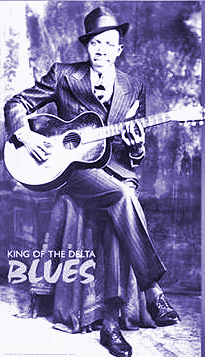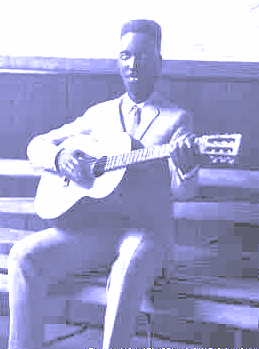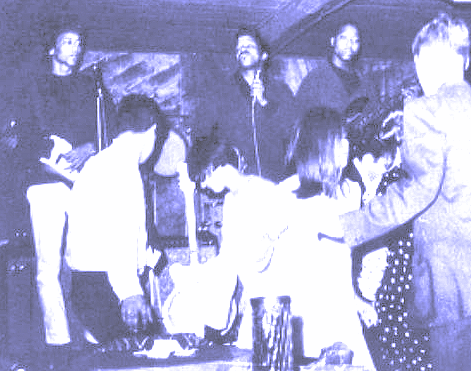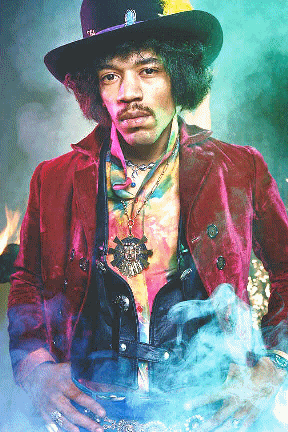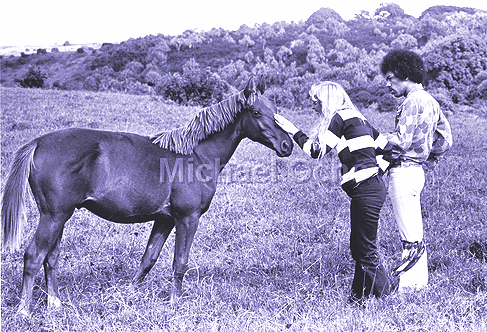 |
  |
 |
published: August 28, "2005"
Dominator Blues |
|

What's New & Previews
Jimi's Prediction —
A Remote View About Jimi Hendrix Timeline Blog Asteroid Impact Evolution Woodstock Blues Jimi Code VS. Da Vinci Code Credit Thefts Missile Agency/Moon Base Charade Remote View Mutation Seattleland Censorship Events Skewed Science Search Engine Rankings Download An Ad AT&T: New Nuremberg Wall(y)flower Syndrome Rochester Media DVD/CD Store More Links...  Page 5 of 7
Son House 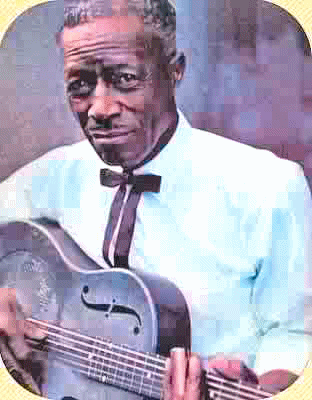
MCA 1994: Son House and Willie Brown were the elder teachers that teenage Robert Johnson approached before he could play.
PBS 2003: Son House: "Some of my old favorite boys, I love all of them so far as that: Charlie Patton, Willie Brown, Robert Johnson - and they died, one after the other."
MCA 1994: Son's bottleneck sermons raised Hell 'n' Brimstone. We'd sit at his feet on tattered rugs and hear Delta tales about Willie Brown, who also once lived in town [Rochester]. Among the pillars of country bluesmen, House stands with Charly Patton and Robert Johnson as the original Trinity.
PBS 2003: Son House: "I stopped playing for 16 years until Dick Waterman found me."
PBS 2003: Dick Waterman: "In April of '64 Bucka White said he'd seen Son House in Memphis…where he had retired from the railroad. So Son House said he'd come back to playing…he wasn't doing anything, so he said OK, he'd try it."
MCA 1994: "When I re-discovered Son in June of '64," recalls Waterman, "we talked about Robert Johnson, and he was trying to recall Robert. Then his wife, Evie, said, 'Oh Son, you know; Robert Dusty!' And Son perked up and said, 'Oh, Robert Dusty!' And then Son said, 'Man, he was always hanging around with me and Willie Brown, wanting to sit-in and do a song…We let him sit-in and he would up and break a string, and where we gonna get a new string late Saturday night, man? And we had to tie that broken string together and tear up our fingers!"
PBS 2003: Son House was like jinx blues, he's like banging on it. I think Son House was, to me, more country, more rual. Whereas Robert Johnson was more uptown, more urban…Some people call it the devil's music…Peatie Wheatstraw claimed to be the devil's son in law…Coming to the Crossroads, I found luck has nothing to do with God or the devil. It was a matter of fate. Some bluesmen played with fate, they acted as sort of tricksters associated with good and evil. But in the end they searched for redemption. Tommy Johnson was one of the first to claim that he sold his soul to the devil, that took nerve. Robert Johnson was rumored to have gone to the crossroads to bargain his soul away for the artistry of the guitar. When he came back from the Crossroads his style was different. He seemed to be another person...We're gonna wait to see if the devil comes, this is the crossroads where Robert Johnson sold his soul to the devil, the real devil.
MCA 1994: It was through the eyes of Son House that the world had a window on the legend of Robert Johnson…House was the witness who saw Johnson return transformed from the Crossroads. Peter Welding was among the first to interview Son about this. "Welding met Son House in October of '64 in Chicago," states Dick Waterman, "because I was with him." In a Downbeat [magazine] '66 article, Welding quoted House relating how Robert Johnson had "sold his soul to the devil in exchange for learning to play like that." Stories about midnight pacts at a country crossroads were part of old Delta lore. Tommy Johnson (an unrelated predecessor of Robert) was one of the most influential early country bluesmen, and he claimed that a pact with the devil at a country crossroads was the source of his talent. The story of how this happened was published in a 1971 book (Tommy Johnson) by David Evans. Greil Marcus' 1975 Mystery Train was the first book to explore Robert Johnson's "devil pact" as described by Son House, but it wasn't until Deep Blues by Robert Palmer was published in 1980 that details of the Crossroads legend were presented as part of Robert Johnson's legacy. Through these books the old Delta tale became known to the world. Robert Johnson recorded Crossroad Blues on Nov. 27, 1936. On that day six years later Hendrix was born.
SHAMAN TRANSFORMATION
PBS 2003: Jimi Hendrix took that leap, like the kind of leap that they say Robert Johnson took when he went to Highway 61, he just took this leap forward, because if you listen to early R&B recordings or things that he did, you know, he sounds like a lot of guitarists that were around at that time, but somewhere he just took a great leap forward.
MCA 1994: The image of Robert Johnson at the Crossroads was about to be echoed by Hendrix. Whether Jimi traveled to a Crossroads, or simply past the outskirts of infinity, somewhere along the line a supernatural transfer inhabited his blues. Jimi was supernaturally transformed too, he sang about it in Voodoo Chile. A Macon initiation. The rite of passage ritual. Death of the mothered boy child, rebirth as Voodoo Child bluesman. As was his habit, Jimi cloaked what he couldn't say with a metaphor…
MCA 1994: Nobody wants to face up to it but the cat has somethin', only everybody's against him because the cat might be a little bit different. So he goes on the road to be a Voodoo Child, come back to be a Magic Boy. - Jimi
MCA 1994: His Harlem girlfriend, Fayne, recalled, "He was so tormented and just so torn apart, like he was obsessed with something really evil. He'd say, 'Well, you're from Georgia,' so he'd say I should know how people drive demons out, because I used to talk about my grandma and all her weird stuff. He'd talk about us goin' down there and havin' some root lady drive this demon out of him! He used to always talk about some devil or somethin' was in him, and he didn't have any control over it."
RP 1999: Mushroom hallucinogens and other psychoactive plants enhance the perceptual skills of the shaman. Being the tribal seers, their peers rely on shamans to interpret urges and translate behavior. Their heightened intuitions enable them to sense intentions hidden by social customs. "At its fullest," notes Terrence McKenna, "shamanism is not simply religion, it is a dynamic connection into the totality of life on the planet."
RP 1999: Describing a typical shaman transformation, Joseph Campbell explains, "A boy becomes sick, psychologically sick...the child begins to tremble and is immobilized and the family is terribly concerned about it and they send for a shaman, who has had the experience in his own youth, to come as a psychoanalyst, you might say, and pull the youngster out of it. But instead of relieving him of the deities, he is adapting [the boy] to the deities and the deities to himself. It's a different problem from that of psychoanalysis. I think it was Nietzsche who said 'be careful lest in casting out your devil you cast out the best thing that's in you.' Here, the 'deities who have been encountered of the powers,' let's call them, are retained, the connection is retained, it's not broken, and these men then become the spiritual advisers and gift-givers of their people...The shaman is the person who has in his late childhood/early youth, could be male or female, had an overwhelming psychological experience that turns them totally inward, the whole unconscious has opened up and they've fallen into it. It's been described many, many times and it occurs [worldwide] all the way from Siberia right through the Americas right down to Tierra del Fuego. It's a kind of schizophrenic crack up, the shaman experience: dying and resurrecting, being on the brink of death and coming back, to actually experience the death experience; people who have very deep dreams - dream is a great source of the spirit - or people who, in the woods, have had mystical encounters."
RP 1999: Like you might see an animal or something like that, and all the sudden you might have a very funny feeling go through you for a second. Like one time I seen this deer, I see a lot of deer around where I used to be from, and I said, "Wait!" Something went through me for one second, like I seen him before, like I had some real close connection with that deer for one split second, and then it just went away...Have you ever laid in bed and you was in this complete state where you couldn't move or nothing? You're like that and you feel like you're going deeper and deeper into something, not sleep, but it's something else. And every time I go into that then I say, "Oh hell, I'm scared as hell," so you try to say, "Help! Help!" You can't move, you can't scream, and you say "Help!" and you finally get out of there, because you just can't move. It's a very funny feeling.
RP 1999: "Shamans play the role that the priesthood plays in our eyes," notes Joseph Campbell. "There's a major difference, as I see it, between a shaman and a priest: a priest is a functionary of a social sort, the society worships certain deities in a certain way and the priest becomes ordained as a functionary to carry on that ritual, and the deity to whom he is devoted is a deity that was there before he came along. The shaman's powers are symbolized in familiars; deities of his own personal experience, and his authority comes out of a psychological experience, not a social ordination. He would become the interpreter of the heritage of mythological life...The myth makers in earlier days were the counterparts of our artists today."
|
| © 2005 First Century Press. All Rights Reserved. Contact Us |

